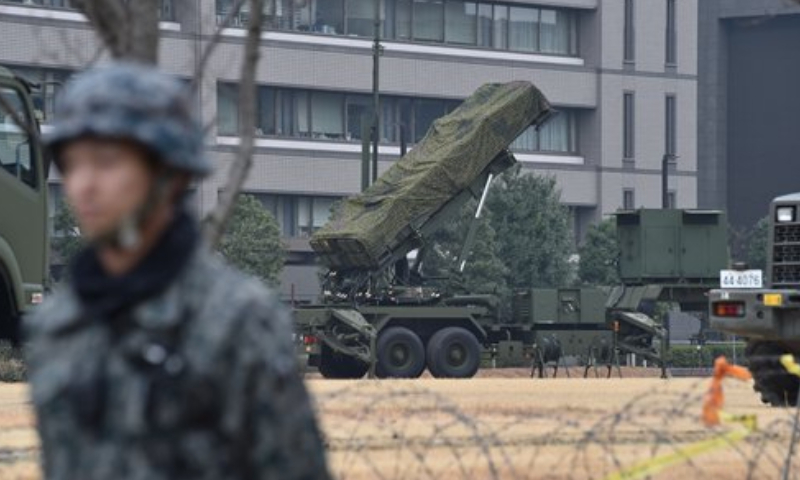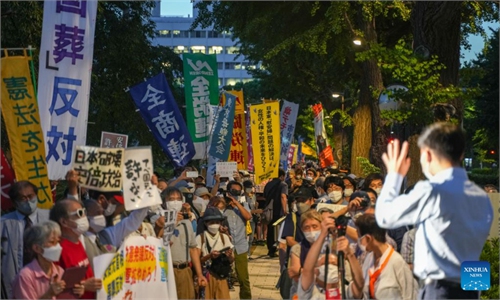Japan's plan to amass 1,000 long-range missiles against China 'has nothing to do with situation across Taiwan Straits, exposes Japan's peace-breaking ambitions'

A Japan Self-Defense Forces soldier stands guard near a PAC-3 surface-to-air missile launcher unit (center) in position at the Defense Ministry in Tokyo on March 6, 2017. File Photo: AFP
Japan is considering amassing an arsenal of more than 1,000 long-range missiles capable of reaching foreign soil in a move to close the "missile gap" with China, Japanese media reported on Sunday. An observer said such a decision to mass-produce such missiles, if confirmed, marks Japan's path to flexing its military muscles and a start for Tokyo to break the pacificist constitution of developing more weapons that the constitution forbids, and the country's further walking away from the pacifism after its defeat in World War II.
Japan is considering amassing an arsenal of more than 1,000 of its planned long-range missiles, the Yomiuri newspaper reported, citing unidentified people with knowledge of the plans.
The projectiles will be deployed mainly across the Nansei Islands and Kyushu, according to the article. By doing so, Japan is seeking to close the "missile gap" with China, Bloomberg reported.
Reuters has linked this information to China's military drills around Taiwan Straits after Nancy Pelosi, speaker of the US House of Representatives, visited the island earlier this month.
Yet Chinese experts believed such connection is baseless, and it is Japan's conspiracy of using as excuse to boost its military power and break the pacifist constitution.
Japan has been hooting about boosting its strike capability on foreign soil in 2020 and 2021, and one way to enhance such capacity is to increase its number of long-range cruise missiles, Song Zhongping, a Chinese mainland military expert and TV commentator, told the Global Times.
What's worth noticing is that Yomiuri reported on Wednesday that Japan is planning to mount long-range cruise missiles capable of attacking land targets on new Aegis system-equipped destroyers to be built.
This information reveals Japan has had that ambition to build such military power for a long time. Song said that although 1,000 long-range missiles is just a number, by revealing such information, Japan wants to demonstrate that it is endowed with the capacity of mass production of long-range missiles. "Japan can actually produce such missiles according to its needs," said Song.
He said that those signals further proved that Japan's building of medium- and long-range missiles has nothing to do with recent tension across Taiwan Straits, yet Japan's revelation at this juncture has its own agenda.
Then-Japanese Defense Minister Nobuo Kishi said in an interview with Kyodo News in April that the ministry will go ahead with discussions on a controversial plan that would allow Japan, which has long held an exclusively defense-oriented policy under its war-renouncing Constitution, to acquire so-called enemy base strike capabilities.
In response, Senior Colonel Tan Kefei, spokesperson for China's Ministry of National Defense, said in April that Japan's efforts to break through Exclusively Defense-Oriented Policy are alarming indicators that the international community should be extremely watchful and concerned about.
Song said that in recent years, Japan has been striving to break the Exclusively Defense-Oriented Policy, and boosting to lift the ban on right of collective self-defense, which gives Japan capacity of both strike and defense, especially the ability to strike other countries.
Political forces that support a constitutional revision also won two-thirds of the seats in the chamber in Japan.
Japan's change of constitution also needs US nodding, and US needs Japan's help to realize its hegemony; thus the possibility of Japan to break through Exclusively Defense-Oriented Policy is very high, said Song.
The military expert also said that the potential deployment of long-range missiles is just one step for Japan, and in the future, Japan could develop ballistic missiles, nuclear-powered submarines and even aircraft carriers, which are forbidden by the pacifist constitution.
Song said that the revelation of such information via media shows that Japan is preparing for a breakthrough in procedure of changing the pacifist constitution; on the other hand, planning long-range missiles can also change Japan's Exclusively Defense-Oriented Policy by fact.

